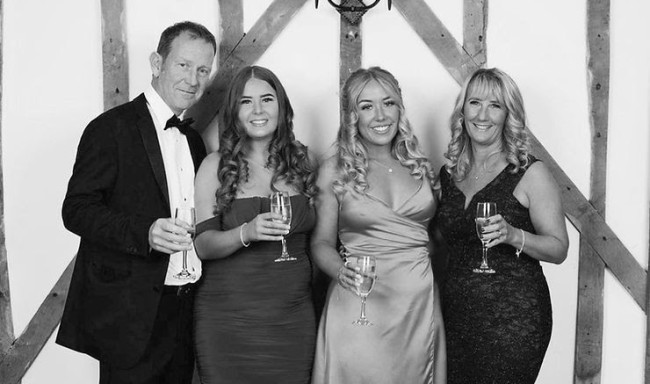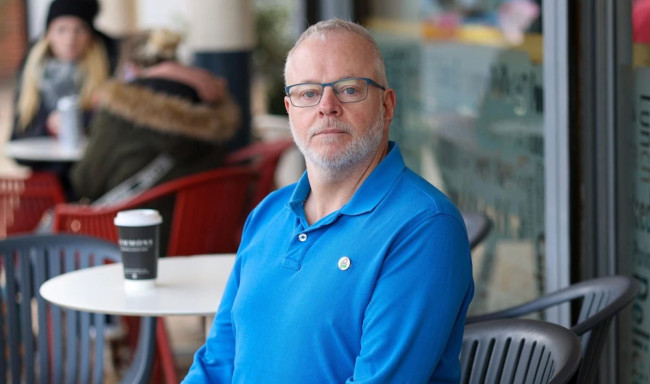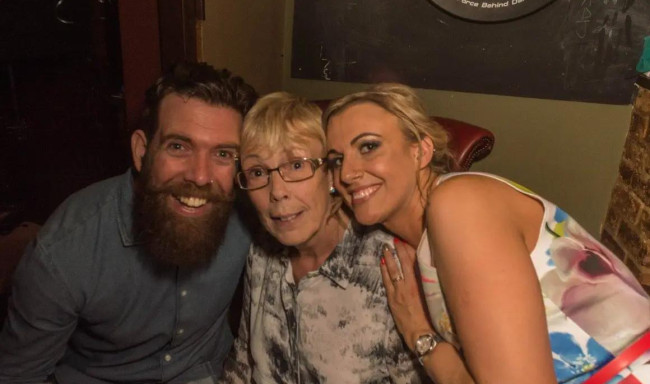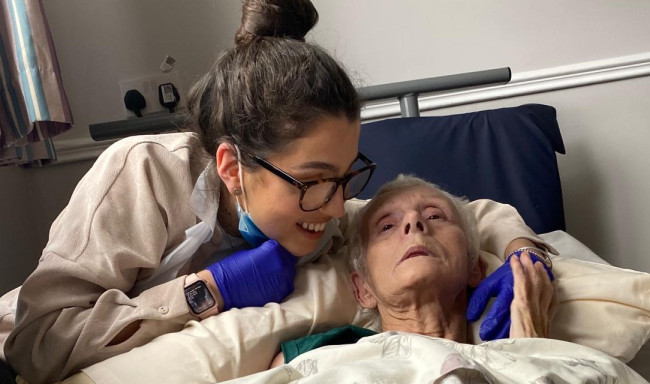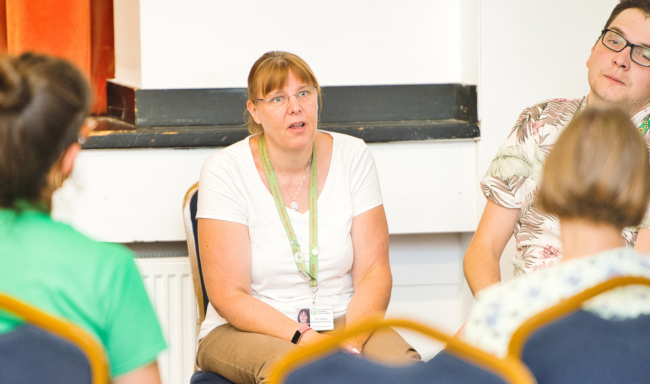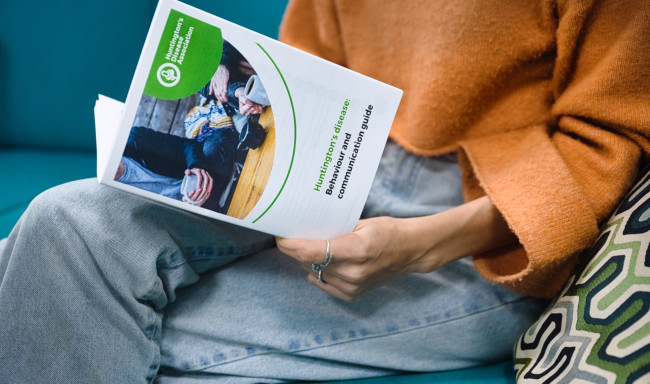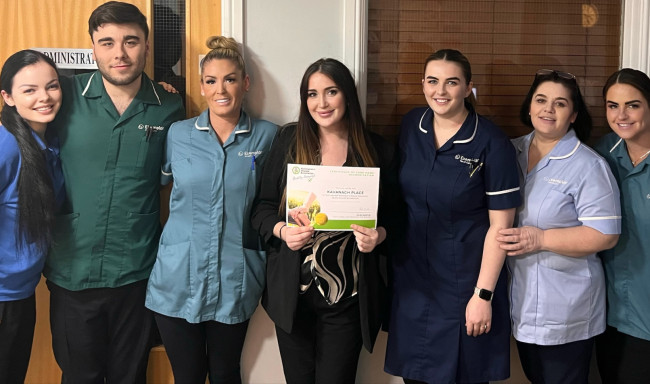Ahead of Carers Week we spoke to Megan who is a young carer for her dad. At just 20 years old, she has been caring for her dad for the past eight years. She talks to us about the role reversal between herself and her dad and how this changed her outlook on his diagnosis.
Tell us a little bit about yourself and your connection to Huntington's?
"I’m Megan, I am 20 years old, and I live in Nottingham. I am currently studying a health and social care degree at the University of Derby and became a young carer for my Dad at the age of 12. My dad was diagnosed with Huntington’s disease in 2012 when he began displaying involuntary movements especially in his hands and legs. In the beginning I remember people asking if my dad had maybe had too much to drink or would stare at him due to his gait – the lack of understanding and awareness is what would anger me the most."
What was life like before your loved one tested positive for the Huntington gene?
"My Dad has forever been a football fanatic and sports lover, we would often go to the park on a Sunday with a football and have a kick around, or be stuck inside watching the Premier League. He enjoyed going to watch his local team Nottingham Forest or even going for a round of golf with his friends. The rest of the time was spent surrounded by family and friends – we would often have a games night or go to the pub for dinner."
Were you aware of Huntington’s in your family before symptoms arose?
"My Dad was the first to be diagnosed in the family as far as family records show, so his diagnosis came as quite a shock."
How did it make you feel finding out about the disease and how did it affect your life?
"When dad was initially diagnosed it seemed quite scary and isolating – at the time I didn’t really tell anyone as I felt almost protective over him. I was only 12 and Google was a very scary place. I would spend hours and hours reading all about Huntington’s, how it affected individuals, that I had a 50 percent chance of inheriting the disease and that there was no cure. When I reflect back to the time of my dad’s diagnosis, I was embarrassed by the symptoms he was displaying as I didn’t know how to react. I think a lot about how dad felt during this time, and how hard it must have been to tell his daughters about his diagnosis. Once I’d accepted the role reversal that had happened between myself and my dad, I began to accept that this was my normality. I needed to make the most of having him here with us. I remember when we would go out for dinner, I would be terrified that people might stare, so I would wear something extra bright or ‘out there’ in the hope to distract people and I would hold his hand so he didn’t feel alone, with a big smile on my face as if to say, I’m so proud of him."
What is daily life like for you now as a carer and how has your view of life changed after your experiences with Huntington’s?
"Being a carer for my dad has made me appreciate the little things in life. It makes me grateful that I am healthy and that I have amazing family and friends surrounding me. Caring is hard, it’s physically and mentally draining, but love overrules that. The love I have for my dad even after a day of him repeating my name over one hundred times, he will blurt out ‘I love you,’ and those good moments always outweigh the bad. My experience with Huntington’s has definitely made me more socially aware and made me want to make a difference with how vulnerable people are treated within society, especially young carers."
As a carer for a loved one affected by Huntington’s disease how do your friends and family support you physically or emotionally?
"My friends and family are always there on standby I guess, there to listen, there to cry, or there to just make you laugh. I like it when my friends and family ask about dad and aren’t afraid to talk about him honestly about how he is doing. My friends and family all are very understanding and respect that I have a lot of responsibility and have to regularly put my dad first when making decisions or even plans. Personally, I think it is important to remember who that loved one once was to the carer, as I guess that is where anticipatory grief comes into things."
What is the one thing you find most useful and supportive as a carer of someone affected by Huntington’s disease?
"The most useful thing I find as a carer of someone affected by Huntington’s disease is finding others who are in the same situation, whether that is just following someone who posts on social media regarding Huntington’s or reaching out and personally messaging them. It is so comforting to meet others who are in a similar position to you. During lockdown, I have been attending meetings that are set up by the Huntington’s Disease Association where you can meet others who are carers too. At the beginning when dad was first diagnosed, I felt isolated and alone. I think that was mainly due to the blank expressions I would receive when I spoke about dad’s diagnosis, but to meet others that understand really made me feel a whole lot better."
Do you have any advice for others who are having similar experiences to yourself?
"My advice to others would be, be honest and be open about what you are going through – especially if you are a young carer in education. There is so much support out there you can receive but you have to make the first move. I didn’t tell anyone about what was happening at home for years, and it is my biggest regret, because now I feel proud of the person my dad was and all that he has taught me. It is nothing to be embarrassed about, it is no one’s fault what you are going through. You just have to love that individual who is affected by Huntington’s unconditionally, give them support, be patient and spend wholesome time with them."


Thank you so much to Megan for sharing her story with us.
If you have a story to share, please get in touch with us via email.
If you are affected by Huntington’s disease and are in need of support or advice, please contact us on 0151 331 5444 or email info@hda.org.uk. Our dedicated phone line is open 9 am – 5 pm, Monday – Friday with Specialist Advisers waiting at the other end to offer you support.
If you are a carer for a loved one, you can find information on how to get support here.

